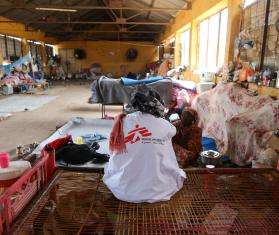Tens of thousands of people displaced by fighting between the Congolese armed forces and the FRPI militia group are living in precarious conditions in northeastern DRC.
After fighting forced tens of thousands of people to flee their homes in Orientale Province, in northeastern Democratic Republic of Congo (DRC), Doctors Without Borders/Médecins Sans Frontières (MSF) has strengthened its medical activities in the Ituri region in order to aid the displaced populations.
In late August, fighting broke out in Orientale's Ituri region between the Congolese armed forces and the Force de Résistance Patriotique de Ituri (FRPI) militia. As they fought for control of Ituri's southern zones, thousands fled in search of safer ground.
In the town of Geti, community leaders estimate that the population increased fivefold in a matter of days. At MSF's project in Geti, the number of medical consultations have tripled since displaced people began arriving in the area. MSF therefore opened two extra health posts near the displaced persons’ camps, and teams are conducting over 500 medical consultations each day. MSF staff is also working round the clock to supply safe drinking water for some 20,000 people.
“Large concentrations of people are living in precarious conditions,” explains Marc Poncin, coordinator of MSF’s emergency activities. The organization continues to evaluate the health situation within the area, and plans to construct 800 latrines in the camps as quickly as possible. MSF will also distribute kits containing plastic sheeting, blankets, mosquito nets, and soap for 10,000 people within Geti and in the surrounding area.
“The humanitarian situation in Ituri is very disturbing,” continues Mr. Poncin. “The region hasn’t seen such a large wave of displaced people since the crisis in 2008. Responding to the urgent needs of the population in the middle of [a] military conflict is an enormous challenge. MSF, the only humanitarian organization currently present in the region, is not in a position to respond to all the population’s needs, especially in terms of shelter, food, and other essential items.”



